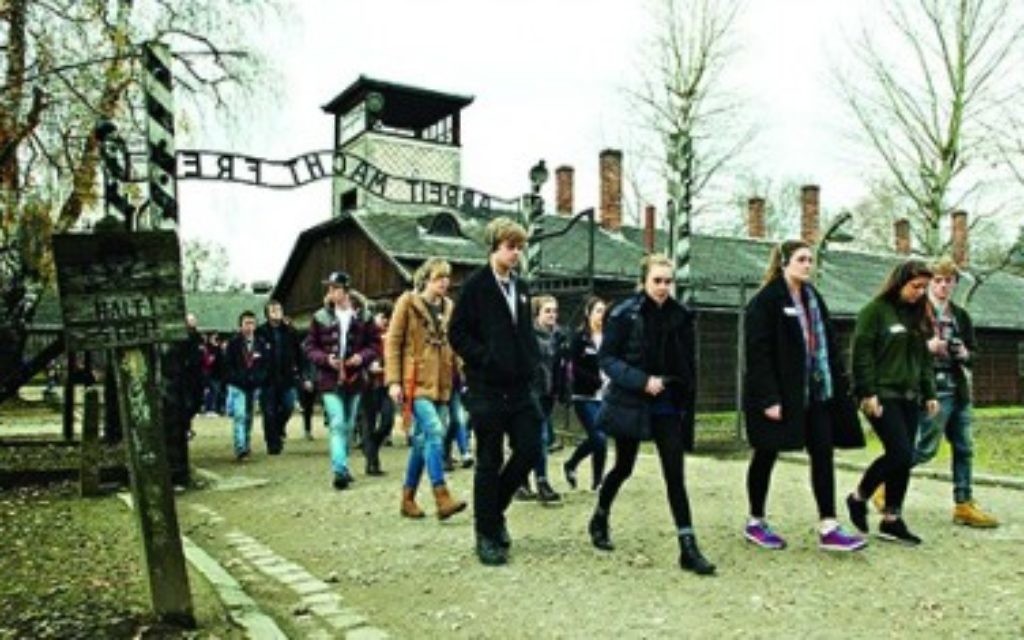Dame Helen Hyde: Learn to see early warning signs and take positive action
Dame Helen Hyde, Headteacher, Watford Grammar School for Girls
Holocaust Education is embedded in our curriculum, taught overtly from year nine in the religious studies department and linked to Anne Frank, making it accessible to this age group.
Steven Frank, a survivor, and friend of the school, speaks to the whole year group about his experience in Theresienstadt.
The students look at their own prejudices and then move to studying Nazi prejudice and where it led. They study topics such as life before the Holocaust, perpetrators, bystanders, rescuers, resilience.
Get The Jewish News Daily Edition by email and never miss our top stories Free Sign Up
In year 10, students learn the historical narrative in history and many visit Amsterdam and the Anne Frank House. Drama students produced a play on Kojarzyć and to do so studied life in the Warsaw ghetto. They then visited Warsaw and Treblinka. Roman Halter spoke about his art to our A-level fine arts classes; the drama department produced a play about his life.
For the past seven years, the school has organised and hosted a Holocaust Conference. The 200 students of our lower sixthform attend, we invite local schools and the conference is also open to the public. Each year, I try to have a renowned Holocaust researcher or historian as the keynote speaker. Survivors talk to the students in groups, making the questions and answers a personal and moving experience.
Staff in different subject areas have received Holocaust training and run workshops at the conference.
Topics range from propaganda, historical perspectives, the geography of the Lodz ghetto, the perpetrators, the kindertransport and more.
The conference is important to the students because it asks them to listen, to learn, to reflect, and then to decide what action to take.
A colleague and I have been taking students to Holocaust related countries for many years; each group of 40 studies the events in the particular country (Germany, Hungary) and then visits Poland.
I have taken groups of adults on study tours to Poland: many adults know very little about the trauma and the enormity of the loss.
Why is it so important to teach about the Holocaust? Because we must never forget, we must learn to see early warning signs and to take positive action. We must study it because it helps to develop understanding of the ramifications and dangers of prejudice, racism and stereotyping in any society.
It helps us to think about the use and abuse of power, and the roles and responsibilities of individuals, organisations and nations. For me, this is a passion and a necessity. For years I could not speak about this and my father never told me much about the loss in our family. Eventually I contacted a surviving cousin and visited the sites in Amsterdam and Poland.
I have had the benefit of being trained by the Imperial War Museum and by London University. I am privileged to have survivors as my friends. It is my duty now to help them and take up the essential role of talking and teaching about the Holocaust, and our duty to teach the young and help them to try to understand it and try to prevent similar horrors.

Thank you for helping to make Jewish News the leading source of news and opinion for the UK Jewish community. Today we're asking for your invaluable help to continue putting our community first in everything we do.
For as little as £5 a month you can help sustain the vital work we do in celebrating and standing up for Jewish life in Britain.
Jewish News holds our community together and keeps us connected. Like a synagogue, it’s where people turn to feel part of something bigger. It also proudly shows the rest of Britain the vibrancy and rich culture of modern Jewish life.
You can make a quick and easy one-off or monthly contribution of £5, £10, £20 or any other sum you’re comfortable with.
100% of your donation will help us continue celebrating our community, in all its dynamic diversity...
Engaging
Being a community platform means so much more than producing a newspaper and website. One of our proudest roles is media partnering with our invaluable charities to amplify the outstanding work they do to help us all.
Celebrating
There’s no shortage of oys in the world but Jewish News takes every opportunity to celebrate the joys too, through projects like Night of Heroes, 40 Under 40 and other compelling countdowns that make the community kvell with pride.
Pioneering
In the first collaboration between media outlets from different faiths, Jewish News worked with British Muslim TV and Church Times to produce a list of young activists leading the way on interfaith understanding.
Campaigning
Royal Mail issued a stamp honouring Holocaust hero Sir Nicholas Winton after a Jewish News campaign attracted more than 100,000 backers. Jewish Newsalso produces special editions of the paper highlighting pressing issues including mental health and Holocaust remembrance.
Easy access
In an age when news is readily accessible, Jewish News provides high-quality content free online and offline, removing any financial barriers to connecting people.
Voice of our community to wider society
The Jewish News team regularly appears on TV, radio and on the pages of the national press to comment on stories about the Jewish community. Easy access to the paper on the streets of London also means Jewish News provides an invaluable window into the community for the country at large.
We hope you agree all this is worth preserving.
-
By Brigit Grant
-
By Laurent Vaughan - Senior Associate (Bishop & Sewell Solicitors)
-
By Laurent Vaughan - Senior Associate (Bishop & Sewell Solicitors)
-
By Laurent Vaughan - Senior Associate (Bishop & Sewell Solicitors)
-
By Laurent Vaughan - Senior Associate (Bishop & Sewell Solicitors)























